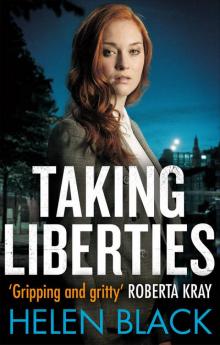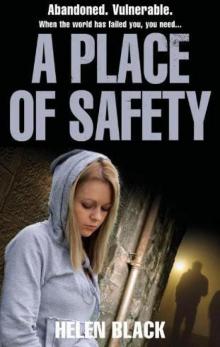- Home
- Helen Black
Damaged Goods Page 17
Damaged Goods Read online
Page 17
As she came out onto street level the glare seemed impossibly bright and Lilly scrambled for her sunglasses. This Indian summer must end soon.
The road in front was bumper to bumper as the stream of traffic inched towards Fleet Street on the left and St Paul’s on the right. The air was thick with the choking stench of pollution. Couriers on bicycles wove in and out of impossibly tight gaps, clad in impossibly tight shorts. The pavement was a seething mass of men and women in dark suits shouting into their phones and hurrying to collect their lunchtime sandwich. The frenetic activity made Lilly dizzy.
The walk to Old Bailey, the unimposing street that housed the Central Criminal Courts, would only take five minutes, so Lilly sauntered. She was early and had no intention of breaking into a sweat. After her television debacle she was determined to look collected and stylish.
When she turned from the narrow street towards the court she felt a stab of disappointment at the relative quiet, despite herself. The press pack clearly had bigger fish to fry elsewhere.
A middle-aged couple with peaked caps and money-belts squinted up at the building and shook their heads.
‘This can’t be it,’ said one.
Lilly smiled. The façade of the Old Bailey was singularly unimpressive and gave little indication as to its identity. Built in the 1970s as a mere annexe to its majestic yet ancient neighbour, the main courtrooms were housed in a flat box of grey breeze blocks. No ornamentation or ceremonial architecture, the only colour a small plaque bearing the cross of St George that declared the building the property of the London Corporation. The famous domes and Justice herself, gold, blindfolded, scales aloft, were only feet away, but could only be seen at a distance from the other side of the road.
Lilly left them to check their guidebooks. They’d find the small door to the public gallery in the end.
She went inside and wasn’t surprised to find extra layers of security. Each visit, it seemed, saw some new round of technology. She passed through the glass pod and placed her bags on the conveyor belt.
When Lilly had started out in the law, back in the days when she wore shoulder-pads bigger than those of an American footballer, she had found herself on her first case at the Old Bailey. The fat guard at reception had merely looked her up and down, no doubt overcome by the smell of Impulse, and had waved her through.
Five years later an IRA bomb had sneaked itself into Court Five disguised as a flask of soup, and so an x-ray machine had been installed.
The latest innovation was a man with a clipboard who asked each person their business in the court. Lilly wondered whether your average terrorist would fall at this final hurdle, unable to think up a plausible explanation.
‘Lilly Valentine, I’m here for the Kelsey Brand case.’
The guard checked his list. ‘Court number three.’
Lilly smiled, keen to get things underway and get Kelsey out of jail before any real harm could befall her.
‘Has anyone else arrived yet?’ she asked.
‘A Mr Stafford of counsel, Miss.’
Lilly’s stomach clenched. Jez Stafford. Surely Rupes hadn’t booked Jez Stafford. He was one of the best criminal barristers around and tipped to take silk in the next few years. With a reputation for tenacity and superb attention to detail he was always fully booked. Goodness knows how he was available at such short notice.
Lilly saw him hovering at the list board, double-checking which court he needed to find, and recalled their last meeting at a chambers party, when copious amounts of champagne and no food at all had led to a paralytic and energetic session of tonsil tennis in a coat cupboard, curtailed only by Lilly vomiting down a rather beautiful faux-fur jacket from Prada whose owner had cried when Lilly tried to apologise.
‘Jez,’ she called.
He smiled warmly and shook her hand. ‘Good to see you again, Lilly.’
To her relief he seemed to remember nothing of their pathetic fumble. And why would he? A man as clever and handsome as Jez probably spent half his life fighting off drunken divorcées.
‘Walk with me to the robing room, Miss Valentine,’ he said in mock grandeur and they climbed the stone stairs to the second floor.
Jez was already dressed in his black gown. A wing- collar shirt and bands were stark white against his olive skin. He spun his battered grey wig around on the tip of his finger.
The robing room was more than a place to get changed, it was a place for gossip, banter and, more importantly, pre-match discussions with the opposition.
‘We need to go in hard. Impress upon the court how vital it is that this girl be released,’ said Lilly.
Jez didn’t reply.
‘There’s no good reason to keep a child locked up,’ she continued. ‘Don’t you agree?’
He knotted his brows. ‘Who’s for the other side?’
‘Brian Marshall,’ Lilly answered.
Jez, unlike most of those called to the bar, was not a man to criticise fellow advocates, but his raised eyebrow told Lilly he shared her opinion of the QC.
Jez waved at a bench. ‘You’d better wait, you know, here.’
At least he had the decency to look embarrassed that Lilly, as a mere solicitor, was not even allowed inside. She also appreciated the subtle way he left the door of the robing room ajar.
‘Jeremiah,’ boomed the voice of Brian Marshall from inside. ‘Glad to have you on board.’
‘I’m for the defence, Brian,’ Jez replied.
‘Poor you, not a leg to stand on.’
‘We’ll see,’ said Jez evenly.
‘Twenty says you don’t get bail today.’
‘As I said, we’ll see.’
‘Don’t like the odds, eh? Can’t say I blame you in front of this judge.’
‘Who’ve we got?’
‘Hugh Blechard-Smith. Nice old duffer, went to school with him. Not the brightest, to be honest.’
‘I thought he was at the High Court,’ said Jez.
‘He was. Drafted him in especially. I expect he had kittens when he heard he’d got this one.’
Lilly looked around her at one of the oldest criminal courts in England. These walls had heard thousands of trials. The cumulative weight of the Krays, Derek Bentley and Peter Sutcliffe hung in the air. Gravitas and solemnity were etched in every archway, yet the fate of a teenage girl now lay with one man of low intelligence who was, by all accounts, shitting a brick.
Jez came out and opened his mouth.
‘Don’t bother. Let’s find a space and talk,’ said Lilly.
Their footsteps echoed as they made their way to the old part of the building and settled into the farthest corner of a grand atrium. The marble underfoot was hard but exquisitely cool. Lilly was tempted to take off her shoes.
‘I saw you on the telly,’ said Jez with a furtive smile.
Lilly groaned.
‘No more soundbites please. If we need to issue a statement we’ll draft it properly,’ said Jez.
‘You’ll get no argument from me.’
Jez smiled. ‘Now, tell me about Kelsey.’
Defendants in custody were rarely produced for preliminary hearings, when often nothing more complex than a timetable was discussed, and never for bail applications. The logistics were far too expensive. If the lawyers made an attempt at bail and were successful the prison would be informed by telephone and the prisoner released. If not, the defendant would work it out for themselves if they weren’t asked to pack their bags by teatime.
Preliminaries sometimes merited a video link from the jail to the court, but there wouldn’t have been time to make the necessary arrangements for Kelsey. Jez would have to get all his information from Lilly.
She didn’t mince her words. ‘She’s all alone and terrified. We have to get her out.’
Jez rubbed his chin. Lilly thought he’d had a neatly trimmed goatee the last time they met. It had left her with a rash that had subsided before her embarrassment.
‘We have to get her bail.’
‘The thing is, I don’t think we should apply today,’ he said.
‘What?’ Her sudden shout echoed around the empty spaces.
‘We can’t possibly succeed.’
‘Of course we can,’ said Lilly. ‘We have to.’
Jez smiled with enough patience to spill, as far as Lilly was concerned, into patronage.
‘I know it’s difficult, but if we make the application today we’ll fail.’
Lilly was incredulous. ‘So we leave Rochene to rot?’
‘Who’s Rochene?’
Lilly shook her head. ‘I mean Kelsey. Are you saying we won’t even bother trying to get her out?’
‘It’s not a question of being bothered, but one of realism.’
‘What are you afraid of? That you’ll damage your reputation so close to promotion?’
Jez didn’t miss a beat. ‘Don’t be ridiculous. I’m afraid of starting off on the wrong foot with this judge. If we make foolish applications now he won’t listen properly when we need to make a good one.’
‘She’s a kid, she shouldn’t be in jail,’ Lilly shouted. ‘Some of them can’t take the pressure. Some of them don’t make it.’
As Lilly’s voice rose, Jez seemed to lower his own so that he spoke in barely a whisper. Whether deliberate or not, it made Jez seem the more mature of the two.
‘No judge will release her without a psychiatric report,’ he said.
‘Says who?’
‘You do, Lilly. I had the CPS bike over the interview tapes and you make it very plain that you don’t consider Kelsey fit for interview. When Bradbury asks whether Kelsey understands the procedure, you say, and I quote, “I’m not a psychiatrist, nor am I a clairvoyant.”’
Lilly slumped against a wall. ‘It could take weeks to get an assessment.’
Jez pulled out a card from his wallet. ‘This shrink owes me a favour.’
Judge Blechard-Smith entered court with a face like thunder. As a member of the High Court he would usually wear red, but the Old Bailey had a uniform of its own. Like fashionistas the judges who sat there wore nothing but black. By the looks of things it suited Blechard-Smith’s mood. Before the clerk could introduce the parties the judge launched an attack.
‘Mr Stafford, I’m surprised at you. This application is ill-conceived.’
Jez rose slowly to his feet, but the judge was in full flow.
‘No court in the land will grant bail to this girl without a proper medical assessment.’
‘I agree, My Lord.’
‘What?’ barked the judge.
‘The defence is in full agreement, My Lord.’
Blechard-Smith exploded. ‘So what are we doing here? You should know I take a very dim view of wasting court time.’
Jez opened his arms, his stance compliant. ‘The defence have no intention of applying for bail at this stage.’ He smiled, a picture of reason. ‘This is a preliminary hearing, by definition to deal with preliminary matters such as the filing of reports. Our defendant is a child so any psychiatric assessment must be ordered by the court. I am here simply to ask for that and I am pleased Your Lordship has already given the issue consideration.’
‘Quite so,’ said the judge.
Ten minutes later Lilly and Jez were walking back towards Fleet Street. Lilly had to admit that Jez had been impeccable in court. Maybe working with him would be okay.
The bars were already filling up, drinkers spilling out into the sunshine.
‘Fancy a quick one?’ Jez asked.
Lilly was taken aback.
Jez laughed, a sexy gurgle in his throat. ‘If memory serves you’re partial to a glass of bubbly.’
Lilly leaned over Rupinder’s desk.
‘The prodigal daughter returns, no doubt to do her paperwork.’
‘Jez Stafford,’ said Lilly.
‘I hear he’s very good,’ answered Rupinder.
‘I will never tell you anything again.’
Rupinder batted her eyelids.
‘Judas,’ said Lilly, and made for the door.
The paperwork was indeed piled high on Lilly’s desk. And on the table in the corner. And on top of all three filing cabinets. She picked up the nearest form crying out for completion. It was an APP8, an application to extend the public funding limit on a contact case she had been ignoring for weeks. A plea for more money.
Lilly read aloud. ‘What are Mr Stewart’s chances of success? A: Excellent. B: Good. C: Satisfactory.’
She laughed. ‘Where’s the box for “haven’t a clue”?’
She swept all the papers off her desk in an untidy bundle and placed them on the precarious pile on the cabinet. The tower teetered dangerously.
‘Miriam’s been calling.’
Lilly looked up and saw the firm’s long-suffering receptionist-cum-secretary, Sheila, in the doorway. ‘Thanks.’
The paper edifice collapsed on top of Lilly.
‘Couldn’t you have gone through some of this for me?’ she asked.
‘I did,’ said Sheila.
Lilly grimaced. ‘So this lot …’
‘Is all urgent,’ finished Sheila, and fixed Lilly with a hard stare.
‘What?’ said Lilly.
‘Just get on with it.’
The phone rang and Lilly gratefully snatched it up.
‘Lilly Valentine, at your service.’ She waved Sheila and her sanctimonious looks away.
‘Hi,’ came the honeyed reply. ‘I’m Sheba Lorenson.’
Lilly couldn’t place the name. ‘What can I do for you, Miss Lawrence?’
‘It’s Lorenson, and it’s more a question of what I can do for you.’
‘Aha.’
There was a gravelly slurp of laughter. ‘I’m a shrink. Jez asked me to call you. I understand you want me to see the girl charged with killing her mother.’
Lilly pulled the card Jez had given her from her breast pocket and saw Sheba Lorenson’s name embossed on the front. ‘Sorry, I wasn’t expecting to hear from you so soon.’
Another seductive chuckle. ‘Jez can be very persuasive.’
What was the story here? Lilly wondered.
‘I can start tomorrow.’
‘Wow, I am impressed. You must owe him one,’ said Lilly.
‘Several, actually. So tell me, where’s the girl at the moment?’
Lilly checked herself and realised that she hadn’t taken the time to find out.
Miriam put down the phone with a frown. Lilly had refused to discuss what had happened at court and insisted on coming over to talk in person and then going on to Tye Cross together. It could only mean bad news.
At this moment, like much of the time, Miriam felt a surge of guilt towards Lilly. It was unfair to expect her friend to shoulder the burden of Kelsey’s letter, whatever the rules might be on client confidentiality. When Miriam had found the letter she should have handed it straight to Jack instead of sneaking it among the other papers to be sent to Kelsey’s lawyer. This case and Lilly were always headed for heartache, with the spectre of Rochene ever present. Of course, Miriam hadn’t known then that Lilly would be nominated to take the case, but it wouldn’t have mattered. Could Miriam say with any honesty that she would have acted differently if she had known her friend and not an anonymous suit was to become involved? Lilly was the closest Miriam would allow herself to a friend, and although she wouldn’t set out to deliberately hurt her it wouldn’t stop Miriam from doing just that if Kelsey’s case required it.
Why Miriam was unable to put anything before the children she worked with was a source of unending discussion among colleagues. It was a question Miriam asked herself so often that even she was bored with rehearsing the answer.
If only someone had been committed to Lewis then maybe he wouldn’t be dead. If someone had taken the time to talk to him maybe he would have seen things differently. If someone had sat with him in the early hours when his demons beckoned, maybe he wouldn’t have taken the night bus to London Bridge and thrown hi
mself from platform eleven under the 5.25 to Forest Hill. If that someone had been his mother, maybe, just maybe, Miriam could have saved her son and she would not be so obsessed.
Shouts came from upstairs, followed by the tell-tale thud and hiss of a fire extinguisher being let off. Miriam sighed and went back to work.
‘This is a bloody stupid idea,’ David said.
Lilly crammed the remnants of Sam’s supper into her mouth.
‘You know I’m right,’ he said.
Lilly tried to swallow the congealed crumpet.
‘You need a sense of perspective, these children are not yours. Sam should be your priority,’ he said.
Incensed, Lilly pushed the outsized ball of food towards her epiglottis. ‘I don’t see why it’s a problem for you to babysit your own son, and don’t you dare talk to me about priorities. I’m not the one living ten miles away.’
Since they were back on old turf, David produced his standard retort. ‘You kicked me out.’
Lilly also knew her lines. ‘Because you were shagging Botox Belle.’
Suddenly worn down by the relentlessness of these exchanges, Lilly walked to the door. ‘Thanks for coming over, I won’t be late.’
‘I never mind helping out, you know that. But what will you do when I can’t come, when Cara’s nearly due?’
‘I’ll win the lottery.’
David smiled sadly. ‘You don’t do this for the money.’
They heard a shuffle at the top of the stairs and saw Sam peering down.
‘Why is Cara nearly a Jew?’ he asked.
Lilly couldn’t suppress a snigger in David’s direction. ‘Good luck.’
Though it irked her, Lilly had to accept that David was probably right. After her previous experiences in Tye Cross she shouldn’t be heading over there again. What was she trying to achieve?
She wasn’t, of course, trying to achieve anything in particular. She simply felt the need to act. She had tried to follow Penny’s advice and ‘go with the flow’, but inertia was as unnatural to Lilly as it had been to her mother.
‘Time on your hands, mind on yourself,’ said Elsa, who, like most northern women, had little time for navel-gazing.
Like her mother before her, Lilly read on the loo and made phone calls while she ironed. Lilly even sent texts while she sat at traffic lights.

 Taking Liberties (Liberty Chapman)
Taking Liberties (Liberty Chapman) Twenty Twelve
Twenty Twelve Dishonour
Dishonour A Place Of Safety
A Place Of Safety Friendless Lane
Friendless Lane Damaged Goods
Damaged Goods